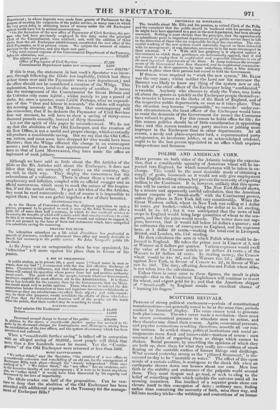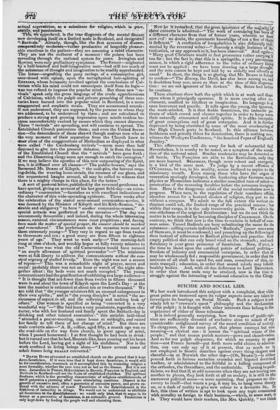SCOTTISH REVIVALS.
PERIODS of strong political excitement—periods of constitutional transformations—are generally noted to be at the same time, periods marked by fanatical display. The same causes tend to generate both plernomena. Theories never made a revolution: there must be severe economical pressure to stimulate men to action, and then theories may direct their course. Again, economical pressure, and popular commotions resulting therefrom, unsettle all our rou- tine notions. In settled times, political institutions and social ar- rangements seem fixed and immoveable—matters of course : men contract a habit of regarding them as things which cannot be shaken. Social pressure, by unsettling the opinions of which they are built up, show them for what they really are—edifices of straw floating on the unstable surface of human likings and dislikings. What seemed yesterday strong as the "pillared firmament," is dis- covered to-day to be "unstable as water." The effect of this upon minds of a certain calibre, is analogous to the shock felt when an earthquake throws down our houses about our ears. Men lose faith in the stability and endurance of the palpable world around them. They must despair and go mad, or seek to cling to the belief of something stable which upholds the universe amid all its seeming mutations. But intellect of a superior grade alone can elevate itself to this conception of deity : ordinary men, feeling rather than conceiving the necessity of faith, miss their way, and fall into monkey tricks—the writhings and contortions of an insane animal superstition, as a substitute for., religionovhich is -ire,
stt1i and passionless, • lhts vie 'apprehend, is the true diagnosis of the mental disease DOW developing itee.if. on.a limited Beide in Scotland, and designated"
‘A,Ravirvals: Already, though, like .the first accesses hf. disease, eetnpanitively moderate-,-:rather • productive . of languidly 'pleasur-
able emotions in the patient—they are assuming a rabid *character. 'fhey are not the ' outburst of a moment s' the poison has been spreading through the national system for years. Irvingism and Itowism were only preliminary symptoms. The former—originated by a half-learned and half-imaginative man—had still too much .of the substance :of. thought and imagination to be readily apprehended. The latter--.-engrafting the puny ravings of a consumptive • girl, over-dosed, withopium, upon the metaphysical hair-splitting of
ERSKANE, whose humanity revolted against the conclusions of Cal- vinism.while his mind could not emancipate itself from its logic—
'y9 too refined. to impress the popular mind. But these new " re-
vivals". speak only the gross language of the crude apprehensions a• Calvinism, which the pulpit and private preaching of three cen- turiesbave .burned into, the popular mind in Scotland, in a more exaggerated and emphatic strain. They are accustomed sounds: if not nnderstood, they are supposed, by the persons to whom they a:readdressed., to be understood by them ; and are calculated to produce a strong and growing impression upon minds restless be- cause uncomfortably excited by causes which they cannot discover. 'These " revivals" are spreading, and will continue to spread. The Established Church patronizes -them ;_ and even the United Seces- sion—the descendants of those shrewd though zealous men who at the very moment of their separation from the Church knew to seer clear of the exaggerations of Methodism as displayed in what were •called "the Cambuslang revivals "—seem more than half disposed to give into the present delusion. It is front the bosom of the Established Church that the " revivals " have gone forth ; tutel the Dissenting clergy seem apt enough to catch the contagion.* Uwe may believe the apostles of this new outpouring of the Spirit, toos itilts diffused over all classes—" The public-houses," says the ilieverend:Mr. BURNS of Kilsyth, "the coal-pits, the harvest reap- ing,fielda, the weaving loom-steads, the recesses of our glens, and the Sequestered haughs around, all may be called to witness that there is a mighty change in this place, for the better." A sort of pastoral lette4published by the reverend gentleman we have quoted, givingan account of his last great field-day—an extra- ordinary "communion "--furnishes us with excellent indications of the character, of this wide-spreading epidemic. . Three weeks after the .celebration Of the stated semi-annual commission-service, it was deemed by the Minister of Kilsyth and his Kirk-Session, " de- sirable and obligatory" to have "another communion-season." A special miracle was performed on the occasion—" The day Was uncommonly favourable ; and indeed, during the whole interesting season, external .circumstances were most propitious i-und, having been made the matter of special prayer, the answer should be marked and remembered." The performers on the occasion were most of than extremely young—" They vary in regard to age from twelve to threescore and ten ; a good many are from fifteen to eighteen years of age." They went to work early—" The morning-bell rung at nine o'clock, and worship began at fully twenty minutes to ten." There was what the old Cameronians would have termed "an ample allowance of spiritual provender"—" The ministers were at full liberty to address the communicants without the con- 844 urgency of stodied brevity." Even the night was not a season Of repose—" This. was a remarkable night of prayer, secret and sovial: probably there was not an hour or watch of the night alto- gether silent : the beds were not much occupied." The young communicants had the gratification of exhibiting to a large audience- " It is thought that not fewer than from twelve to fifteen thousand were in and ,about the town of Kilsyth upon the Lord's Day : at the tent the number, s estimated at about ten or twelve thousand." We are told that "the younger ministers felt an unusual enlargement in their own spirits ;" and in "the young disciples" is noted "the se- riouseess, ef aspeet,in all, and the softening and melting look of others." One woman is specified as being "converted m a very wonderful way "—" She had been a very passionate, regardless cha- racter, who with her husband and family spent the Sabbath-day in drinking and other tainted enormities :" this amiable individual "attended a Prayer-meeting, came home at midnight, and raised her family to tell them of her change of mind." But there are male converts also—" A. B., collier, aged fifty, a month ago was on the road-side on the way from church, in great agony of mind, -when I passed homeward : I at first thought he had been in drink: but it turned out that he had, Hannah-like, been pouring out his heart before the Lord, having got a sight of his sinfulness." Nor is the work confined to living beings alone—" I know several cases of whole houses being REALLY' converted."
Ds.vsh Hymn advocated an established church on the ground that it kept down fanaticism. If it were true that it kept down fanaticism, it would still be for consideration, inasmuch as it accomplished this by rendering religion a mere formality, whether the cure were not, as bad as the disease. But it is not true. Jansenism in France, Hohenlobism in Bavaria, ruscyism in England, and Revivals in Scotland—all are the fruits of. established churches. The spiritual deadness,' which is the prevailing characteristic of religious eitablishments, of itself 'generates a yearning after more stimulating emotions. .Dissent is the strewth of excessive seal, often a guarantee,of excessive power, and grows ra- tional with the advance of years. Fanaticism in the Establishment is the friskiness of imbecility in dotage. 'We would not be understood to attribute all fanaticism to the 'Establishment : we would only blab, that tb argue in its favour as a preventive of fanaticisuvis an untenable ground. Fanaticism is only kept down by feeding the people well and educating them. • 3'N'O*- be 10.cl:harked, that the grois ighoranee of the majority';,)of eenVerts is admitted—" The Wcirk of examining:has* been a'different character ffom that of former years, Whereii, we see): evil:. no doubt, the :systeMatic 'knowledge 'of not a feW of thi is defleierit." 'A confession of irregularities is also deliCately ii nuated by the reverend' Writer-c‘ Scarcely a single 'instance of la; tOxierition, or any approach to it; his been observed." And "Many good Christians would at first pronounce rather carrying l!t tOo.fir : bin the fact is, that this is u springtide, a very ,U•ncuirml? season, in which' a rigid adherence to the rules Of` ordinary i.trhea: must not be applied,: we have been drawing up a large drat* and the nets cannot be kept and laid by so orderly nud.SftentIF as usual." In short, the thing is so glaring, that Mr. BURNS is fore4 to confess—" The Enemy, the Devil, bits also been among us, anA is doubtless busy now, snore so than at the time Of this dispensa.;. tion : we are not ignorant of his devices." So, Satan had better be cautious.
These citations show both the spirit which is at work and thoSe upon whom it principally operates. It is mere craving after ex. citement, unallied to intellect or imagination. Its language is at once irreverent and puerile. It tells upon the young, the ignorant, the weak-minded. It is that feeble fanaticism, the imbecile pa. tients of which crowd and cluster together in order to keep warm their naturally attenuated and chilly spirits. It is alike incapable of great conceptions and of great enterprise. And it is further depressed by being cherished by some of the most overbearing of the High Church party in Scotland. In this alliance between feebleness and priestly thirst for domination, there is nothing new witness the Wesleyan Conference, "the hundred Popes of Engines Jesuitry." This effervescence will die away for lack of substantial fad: Nevertheless, it is worthy to be noted, as a symptom of the eoreli: tion of the national mind. Similar tendencies may be detected.on all hands. The Puseyites are akin to the Revivulists, only they are more learned. STEPHENS, though more robust and energetic, is a bird of the same nest. To judge by a recent effusion of O'Cox.NELL, he too, in his senility, seems inclined to aspire to the missionary wreaths. Even among those who have the organ of veneration sparingly developed, the hankering after German meta-, physics or Mesmerism indicates a similar unsettled turn of mind-5 prostration of the reasoning fliculties before the sensuous imagina- tion. Here is the dangerous crisis of the social revolution now in progress. When men, in the regulation of' their mundane affliirs, abandon reason for a bastard shadow of religion, they put to sea without a compass. We admit to the full extent the veriest en- thusiast could ask, the limited range of the practical reason : but within that range, it is the only trustworthy guide. We admit the one-sidedness of the original Benthamists : but we do not think the matter is to be mended by becoming disciples of COLERIDGil. 011 the contrary, we think that now is the time to reclaim in behalf of cain mon sense. Tamed Radicals are busy substituting the name for tho substance : calling certain individuals "Radicals," ((peer ones some of them are, it must be confessed,) and preaching up the following Of them instead of adherence to Radical principles and practice. Such empty political diet can only breed wind on the stomach; and such flatulency is your great promoter of fanaticism. 'Now, if ever, is the time to insist upon the cardinal points of rational politics— freedom of industry and commercial enterprise, in order that all may be wholesomely fed ; responsible government, in order that the interests of all shall be cared for, and men, conscious of this, re-. main tranquil ; education, in order that sound Minds may inhabit healthy bodies. And, with all due deference to Lord Bnovoliam, in order that these ends may be attained, now is the time to struggle against the intrusting of national education.to the Clew.



























 Previous page
Previous page